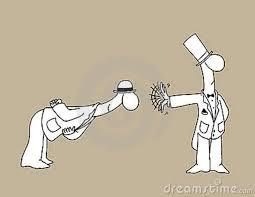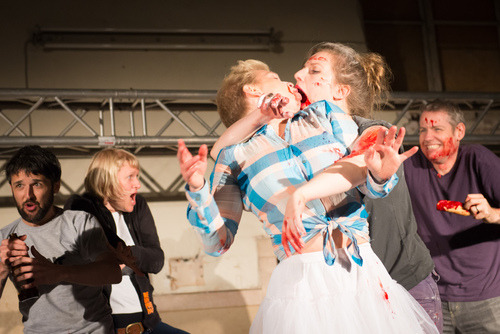
Last month London kicked off the first of a series of 5-aside competitive impro events, and by all accounts it went really well. This prompted me to muse a bit about the benefits and pitfalls of a competitive format. This got big enough for me to split: here I’ll focus on a useful pointer for competitive impro, and one of its biggest benefits.
I’ve played in competitive formats in Europe, the UK and Canada, mostly some derivation or other of Keith Johnstone’s formats, specifically Maestro and Theatresports. I’m repeatedly impressed by the evolved and considered philosophy that sits under them. There is a lot that could be said – Patti Stiles runs workshops on ‘How to do Theatresports better’; Maestro now has a (very unpretentious, helpful) guidance manual. But the idea that made the most impression on me is really very simple.
You shouldn’t be competing.
I heard this first from Tom Salinsky in the run-up to our first Maestro in the pleasant Cockpit Theatre in Marylebone. (I walked past the Theatro Technis, another occasional Maestro spot, on the way to the bar in which I’m writing the first draft of this.) In the next post I’ll get into why this is so important, but to make sense of a show that is both Competition and Not Competition, it’s worth turning to Keith Johnstone, who recounts how he was inspired to create Theatresports by watching wrestling shows. As we all know, the outcomes of wrestling are fixed, but the experience isn’t fake. Wrestling generates ‘heat’ – provoking the audience into an excited, passionate and even angry frenzy – and that kind of experience is a rare one within a theatre. Fake competition generates authentic emotional results. Julia witnessed a Theatresports at the Loose Moose Theatre that epitomises this.
Performers from Calgary and Edmonton were playing each other in ‘The Battle of Alberta. (In reality, the Edmonton team was topped up by some Calgarians, something you wouldn’t normally see in a Derby match!)
In Theatresports, teams get points from a set of serious judges, who are the grown-ups in the room to contrast with the players. Early on, the judges made a fairly harsh call for one of the teams, docking a point for use of the word ‘Bum’. The team made a show of resentment at the call, echoing ripple of dissatisfaction in the audience.
As the show went on, that team started to act out more and more: running into competing scenes, using ‘Bum’ as a punchline, and provoking the judges, who responded unemotionally by docking them points and giving players time-outs – the Theatresports ‘basket’ worn upon the head for 5 minutes.
Both teams were getting on with doing scenes and giving challenges, both doing good work, but with the misbehaving team taking risks in and out the scene, whilst the other team played up their role in the show – the nice, diligent participants.
The audience started getting furious. “Give them points, that’s so unfair.” “They basketed all but one player – how are they going to do a scene? Oh, you’re making them do it on their own?????”(Solo scenes are actually a gift to a player, but within the theatre of Theatresports, they can appear a daunting challenge.) “What? They are all punished? They are all in the basket? Now they just miss even doing a scene!!!” They yelled, roared together, stood up and booed the judges.
By the time the ‘bum’ player basketed for the 2nd or 3rd time, his run through the aisle to the timeout area was met by audience members leaning out to hi-five him, like wrestlers or a baseball game. Thing is, no-one turned up with a strong desire to support that team and boo the ref – to this day, I’m not sure whether the punished team was the home team or the ‘Edmonton’ one. The game ended at 30-7 – the mischievious team were crucified. But everyone got a story out of the show.
And make no mistake, the players of the losing team would have left the show knowing that they had – together with their rivals and the judges – spent the night winning in every sense imaginable. In the next post, I spend a little time exploring why this spirit is so important.

 Maxim Reality. Prodigy dude and a cool guy.
Maxim Reality. Prodigy dude and a cool guy.


